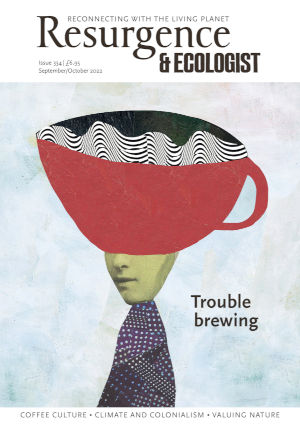Just as for many of us, Richard Seymour’s moment of definitive awakening came not during the reading of an IPCC report, but on a wave of emotion that washed over him unexpectedly while going about normal things. For him, it was on Christmas Day, looking out onto a park that was balmy rather than frosty, when he was struck with “an awful sense of loss, that I could not look away from”.
This moment came late in Seymour’s political life. A rela-tively orthodox Marxist, he’s refreshingly candid about the historical ecological blind spots of his political tradition, and makes no attempt to cover his own tracks, freely admitting that he considered the environment a middle-class distraction from the real political work of stopping wars and overthrowing capitalism. Just a few years on from that fateful Christmas Day, he’s now the sort of person who helps others identify species of bird on Twitter.
As such, Seymour writes with the fevered passion (and panic) of someone who has recently come to realise the magnitude of the climate and Nature emergencies, and this book of short essays allows us to see him accommodating this knowledge to the heart of his political thinking in real time. The Disenchanted Earth collects together pieces from his blog related to ecological crises from around 2017 until more or less the present day, taking us on a whistle-stop tour of topics from nuclear energy to agriculture to the threat of fascism.
The period covered in this book maps onto a period during which the socialist and Marxist left deepened their engagement with the climate crisis, and this collection sits comfortably within this landscape. As Seymour’s own embryonic interest in fields like palaeontology matures into that of someone who has fully integrated climate justice into their worldview, it’s interesting to clock the dates of the pieces and align them with the rapidly politicising climate movement around him.
It really has been quite a five years or so. The year 2017 was, of course, the closest socialists had come to state power here in the UK. In 2018 we saw the rapid mobilisation of school strikers and Extinction Rebellion protests, while leftist Democrats in the US revived the Green New Deal. That quickly translated back over to the UK (where it in fact originated), embedding itself at the heart of both the Labour and the Green manifestos in 2019.
We all know what happened from there – a Conservative landslide followed by a global pandemic – and by the end of this collection an elegiac tone creeps in. Seymour is wandering coastal paths. “It’s all dying,” he says. “Visit it as you would a dying patient.”
Of course, while this has been a period of intense mobilisation and rich intellectual activity, eco-socialism was hardly invented in the last five years, and anyone with any interest in the subject will ultimately find little that breaks new ground here. Indeed, many Marxists have long noted Nature as a key site of exploitation, providing free resources and labour in service of creating surplus value for capital, a tradition of thought that Seymour nods to with a reference to Jason W. Moore.
One key point of distinction in Seymour’s work, however, is his unfashionable interest in psychoanalysis and his willingness to bring it to bear upon leftist politics and contemporary culture. A notable example in this collection is his treatment of ‘disavowal’: the idea of knowing something to be the case, but living your life as if it were not, most commonly applied to the tension of a person knowing they will one day die, but acting as if they will not. Here Seymour relates this to the death of the natural world.
Above all, Seymour remains one of the sharpest thinkers and most stylish writers on the contemporary Marxist left, so while these may sometimes feel like underdeveloped sketches on themes that deserve fuller exploration, he is never less than interesting and insightful. His previous book The Twittering Machine married politics and psychoanalysis in the most incisive exploration of social media yet written. These pieces suggest he could write a full-length work of similar accomplishment on the climate crisis. Judging by the urgent tone of this collection, he’s probably already writing it.






